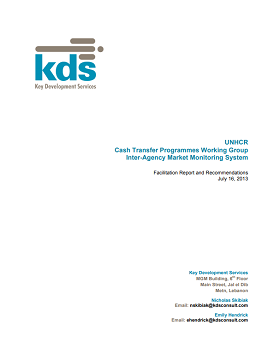UNHCR Cash Transfer Programmes Working Group Inter-Agency Market Monitoring System
The UNHCR engaged the Consultants for technical assistance in developing an inter-agency market monitoring system (MMS) to facilitate a national assessment of cash transfer programmes (CTP) within Lebanon. The request for assistance followed consensus among the International Non-Governmental Organization (INGO) members of the CTP working group on the need for price tracking of a representative minimum expenditure basket (MEB) faced by Syrian refugees in Lebanon and Lebanese host communities. Furthermore, the CTP working group sought the input of external technical experts to ensure impartial evaluation and assistance, thereby improving the chances for commitment from all participating organisations.
The UNHCR does not conduct any market monitoring activities directly, and so instead depends upon data inputs from CTP working group members, several of whom have already developed their own price monitoring criteria and methodology. The MMS—and MEB price tracking in particular—is intended to provide a uniform data stream and database of timely market information to facilitate (and harmonize) programming, programme development, monitoring, reporting, advocacy and resource mobilization.
The Consultants were engaged for a total combined level of effort (LOE) of 6 days. The core deliverable of the consultancy was a one-day workshop to achieve consensus among CTP working group members on the MMS. According to the terms of reference for the consultancy, the expected outputs were:
- Contents of MEB (quantity and quality of items to be monitored, baseline cost of each item);
- Preferred methodology (minimum sample size and geographic distribution, frequency of data collection, format of monitoring tools);
- Framework for the inter-agency database (including scope and guidelines for data compilation, manipulation and analysis).
Additionally, given the market monitoring structures already in place at certain member organisations, a key assumption for the Consultants was that the inter-agency MMS would build on already existing monitoring systems, which in turn required:
- Assessment of existing capacity (existing data sets, different programme mandates, available financial and labor resources, and geographical presence);
- Verification of intent to participate, and that existing resources and tools could support proposed MEB tracking and MMS.
Finally, although MEB price monitoring was the initial focus of this consultancy, it was clear from the terms of reference and early discussions with the UNHCR that the expectations for a harmonized MMS went beyond simple consumer price tracking. Rather, the CTP working group hopes to develop an “evidence base that can guide programme direction.” As such, the MMS would ideally include fartherreaching market information on the available supply of MEB items, as well as signal market disruptions at a local, regional or national level. Such a tool could provide the international community in Lebanon, the Government of Lebanon and other international actors a broader knowledge base on the market effects of cash programming. Nationally-distributed, longitudinal price data from points of sale can richly inform debates on isolating inflationary effects from idiosyncratic relative price movements, as well as provide a solid empirical basis for assessing the required value of cash assistance and other key elements of programme design.



